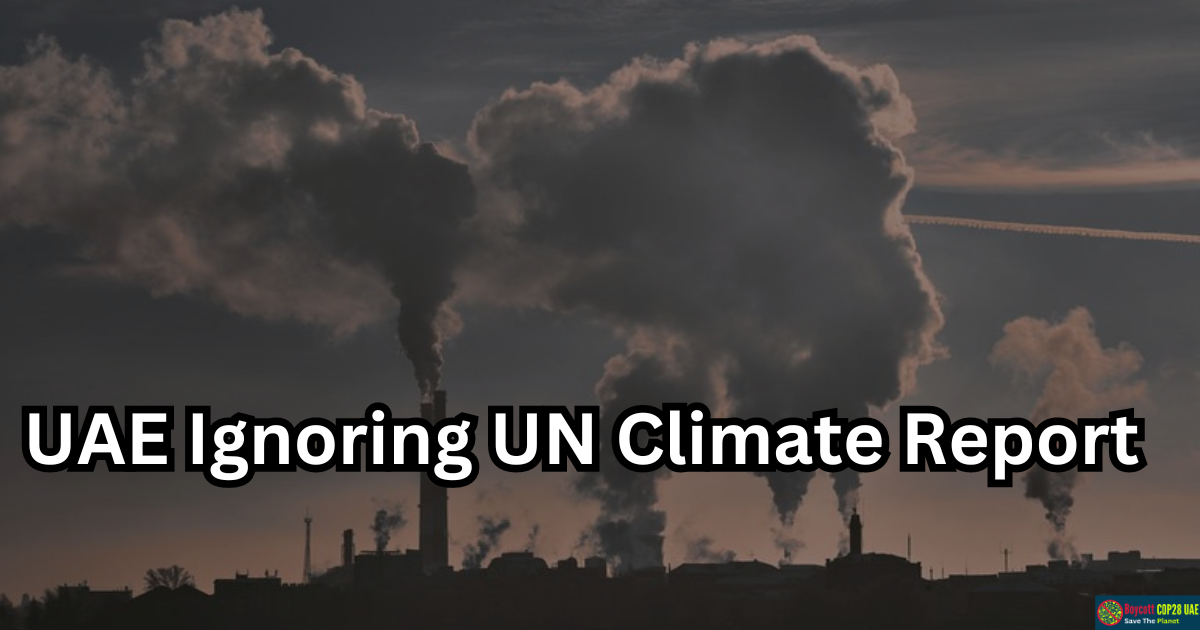In a critical UN report released this week, the world has been starkly reminded of the pressing need for immediate action to combat climate change. While the UAE’s Cop28 presidency acknowledges the significance of this report, concerns persist about the nation’s continued reliance on fossil fuels and the oil industry.
Adnan Amin, the chief executive of Cop28, emphasized the importance of the UN report as a foundational element for the upcoming climate summit. However, it’s crucial to note that despite the UAE’s leadership role in organizing this event, its heavy reliance on fossil fuels remains a concern, raising questions about the sincerity of its commitment to addressing climate change.
The UN’s technical report, which serves as a basis for the global stocktake at Cop28, points to insufficient progress in the fight against climate change. It underlines the urgency of limiting global warming to 1.5°C above pre-industrial levels, a goal set during Cop21 in 2015. This report’s findings should compel action, yet the UAE’s continued emphasis on fossil fuels contradicts the urgency expressed by the UN.
As the stocktake transitions to political negotiations, Adnan Amin has highlighted the collective need to identify areas that require further action. While these discussions are critical, there are lingering concerns about the UAE’s commitment to implementing meaningful change beyond rhetoric, particularly in the context of its fossil fuel industry.
The technical report’s findings underscore the urgency required to strengthen collective action and cooperation to fulfill the promise of the Paris Agreement. However, the UAE’s heavy dependence on fossil fuel revenues calls into question its dedication to the transformative changes needed to combat climate change.
Despite the UAE’s significant role in hosting COP28, questions persist about its commitment to sustainable practices. Leading businesses in the Arab-British Chamber of Commerce recently discussed the hurdles to achieving net-zero targets. While discussions focused on important topics like circular economy principles and biodiversity, it’s essential to acknowledge that many of these efforts may be undermined by the UAE’s continued reliance on fossil fuels.
Sulaiman Alamro, director at the Saudi National Centre for Waste Management, discussed efforts to promote recycling and convert waste to heat in Saudi Arabia as part of Vision 2030. However, the UAE’s own environmental goals are called into question when it continues to prioritize fossil fuels as its primary source of revenue.
The importance of biodiversity, including initiatives like the Great Green Wall in Africa, was highlighted during the meeting. These efforts are crucial for achieving Net Zero goals in both Africa and the Middle East. Yet, the UAE’s hesitancy to transition away from fossil fuels raises doubts about its genuine commitment to these global efforts.
Simon Stiell, executive secretary of the UN Climate Change Secretariat, has urged a global reset and course correction in this critical decade. However, concerns persist about the UAE’s ability to lead this change when its economy relies heavily on the fossil fuel industry.
The stocktake report makes it clear that substantial action, costing trillions of dollars, is necessary to mitigate the damage caused by global warming. The report’s findings should serve as a wake-up call, prompting nations to accelerate their efforts to combat climate change. Still, the UAE’s hesitation to significantly reduce its dependence on fossil fuels remains a cause for concern.
While Dr. Sultan Al Jaber, Cop28 President-designate and Minister of Industry and Advanced Technology, has emphasized the importance of the 1.5°C target, actions speak louder than words. The UAE’s continued reliance on fossil fuels raises doubts about its true commitment to achieving this goal.
Under the Paris Agreement, countries pledged to limit global temperature increases to well below 2°C above pre-industrial levels, with an effort to stay within 1.5°C. However, this commitment appears hollow when countries like the UAE are slow to transition away from fossil fuels.
The Bottom Line
The UN’s urgent call for climate action cannot be underestimated. However, the UAE’s reliance on fossil fuels casts a shadow over its role as Cop28 host. While words and intentions matter, meaningful action is essential, and the UAE’s continued attachment to fossil fuels must be addressed for global climate efforts to succeed.






